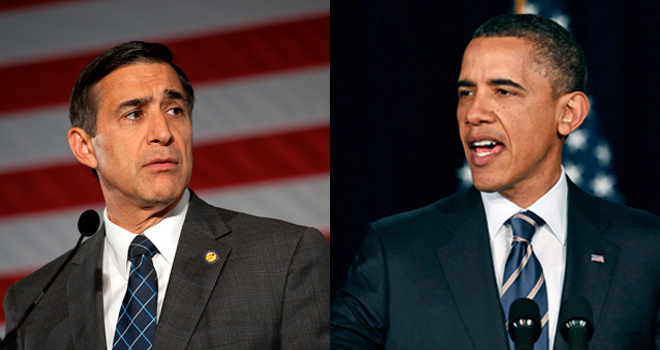As congressional investigators ramp up their investigation into Project Gunrunner, Rep. Darrell Issa (R-CA) is ramping up his rhetoric.
“The Obama Administration has been stonewalling congressional inquiries into the deadly ‘Project Gunrunner’ and ‘Operation Fast and Furious’ debacles since day one,” an Issa spokeswoman told TPM in a statement.
“The Bureau of Alcohol, Tobacco, Firearms and Explosives has refused to comply with a congressional subpoena. The Administration is taking a hypocritical stance when they refuse to answer questions about their own role in arming deadly drug cartels, but are eagerly pointing fingers and placing the blame elsewhere,” the spokeswoman said.
CBS News reported this week that congressional investigators are on the ground in Arizona probing how guns ended up crossing the border during “Operation Fast and Furious” and Project Gunrunner.
It’s increasingly clear that Republicans are hoping to discover that a political appointee in the Obama administration knew about the strategy.
So far, there’s been no direct evidence to emerge that was the case. What there has been is the claim from Darren Gil, the former lead ATF official in Mexico, who told CBS News his supervisor at ATF’s headquarters in D.C. told him the operation was approved by officials higher up than ATF Director Kenneth Melson.
Gil told CBS New that he believes that Lanny Breuer, the Assistant Attorney General of the Justice Department’s Criminal Division, and several of his deputies who visited Mexico last summer knew that ATF officials were allowing guns that they were watching to “walk.”
Issa’s committee has threatened to begin contempt proceedings against ATF’s Melson for not cooperating with their subpoena requests. But the Justice Department has said they made documents available to investigators at DOJ headquarters and are worried that some documents might compromise ongoing investigations and prosecutions.
Law enforcement officials also note that sales to suspected straw purchasers weren’t illegal in and of themselves — it doesn’t become illegal until those guns are actually handed over to another party. For successful prosecutions, the feds have to demonstrate that straw purchasers were purchasing weapons for other individuals and not simply selling their own weapons, which would be legal thanks to weak U.S. gun laws.
It’s clear that the plan was a risky and controversial strategy. One of the gun dealers who was cooperating with ATF warned in emails to the agency that he wanted to make sure his store was “not viewed as selling to bad guys.”
In an email back to the gun dealer in April 2010, ATF supervisor David Roth wrote that officials “are continually monitoring these suspects using a variety of investigative techniques which I cannot go into detail.”
Before the controversy erupted, ATF was being criticized for going after small time straw purchasers instead of getting officials higher up the chain of command. Back in the fall, Justice Department Inspector General Glenn Fine knocked ATF for focusing too much of their effort on low-level gun traffickers while ignoring the bigger cases.
The Inspector General said ATF focused largely on inspections of gun dealers and investigations of straw purchasers instead of on “higher-level traffickers, smugglers, and the ultimate recipients of the trafficked guns.” The report found that 68 percent of Project Gunrunner cases are single-defendant cases and that “some ATF managers discourage field personnel from conducting the types of complex conspiracy investigations that target higher-level members of trafficking rings.”






